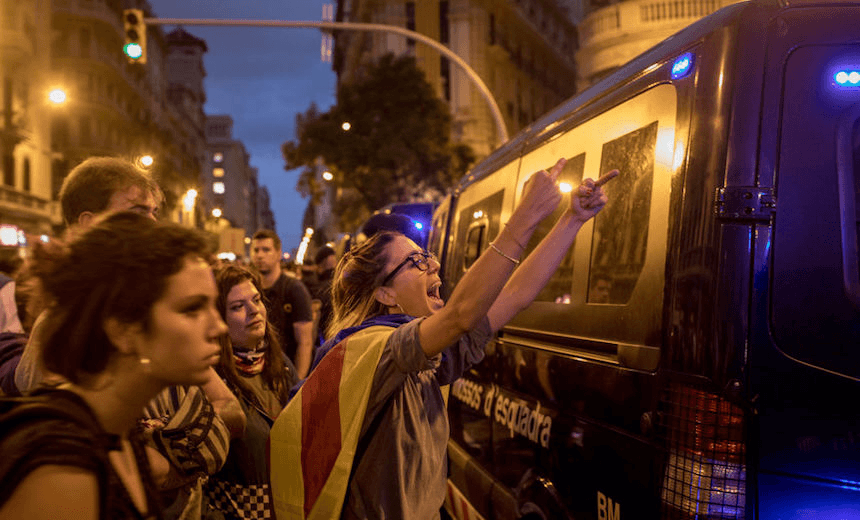The violent suppression of the referendum in Catalonia holds lessons for iwi wishing to establish their independence in Aotearoa, writes Graham Cameron.
In the main, the reporting on the Catalan referendum has been surface level: the Spanish state does not want the region of Catalonia to consider independence. However, for those of us committed to mana motuhake (self-governance), the conflict between the state and the people in Catalonia deserves closer examination.
Nestled in the shade of the southern Pyrenees and caressed by the warm winds of the Mediterranean, Catalonia consists of four provinces and includes the celebrated city of Barcelona. Catalan people have their own distinct language and culture.
After centuries of conflict, Catalonia was formally subsumed into a united Spanish kingdom in 1716. The second Spanish Republic granted Catalonia a Statute of Autonomy in 1931 which allowed for self-governance including a parliament, an executive and a judiciary.
The victory of the fascist Francisco Franco in 1939 led to supppression of Catalan institutions, language and culture. It was not until after his death that a democratic Spain again adopted a Statute of Autonomy in 1979, which was renewed in 2006. At that time, many aspects of Catalan autonomy including a justice system and formal recognition of the language were contested by Spanish conservatives.
This conservative backlash has only increased the support in Catalonia for independence. A 2014 referendum indicated over 80 percent support for an independent state. This referendum saw Catalan lawmakers plan for secession in 2017; the Spanish Constitutional Court suspended their decision, but they vowed to press on with an independence referendum in 2017.
Spanish Courts declared it illegal, and hence we have seen the police attempting to seize ballot papers and paraphernalia prior to the referendum and violent suppression of Catalan voters by imported Spanish police. Over 800 people have been injured. The vote went ahead and even with the violence there was a 42 percent turnout, with 90 percent support for independence.
The ripples of violence against those seeking independence in Catalonia should trouble our waters here in Aotearoa New Zealand. The resolution of historical grievances and developing anew the Treaty partnership between the Crown and tāngata whenua relies not just on law and justice but also consent and goodwill. As we move past reparations to a post-settlement phase in which iwi express their aspirations for the future, we will rely more and more on our democratic and constitutional arrangements as a foundation for difficult discussions.
If we consider the Ngāi Tūhoe settlement, some of those discussions are going to include a desire for independence from the New Zealand state. The Tūhoe settlement includes a pathway for self-government over its land and the health, education and social services its people need. Aspirations for mana motuhake are not indicative of the failure of our democracy and should not be dismissed out of hand; on Catalonia, it was noted in The Economist that “constitutional change, especially the right to break away, should be difficult – but not impossible.”
We would be fools to think we are now immune to using the power of the state to suppress a desire for independence; after all, Ngāi Tūhoe have already attempted to exert self-government. The 1896 Urewera District Native Reserve Act granted Tūhoe the right to self-governance based on its own customs and culture; yet between 1909 to 1921 the same Crown forcibly purchased Urewera land to undermine the iwi authority leading to a collapse of their government.
If Tūhoe aspirations are to be realised in the next 40 years, and if other iwi come to believe that their aspirations are best achieved in independence, our kawanatanga system is poorly designed to embrace the change. Te Tiriti o Waitangi envisaged the continued mana motuhake of tāngata whenua but any suggestion of constitutional change, such as Dr. Whatarangi Winiata’s Treaty house model, are scoffed at in our media and in our Parliament.
Consequently, as Moana Jackson noted on The Hui this weekend, “that kawanatanga sphere has become the only place where our people have been able to try and assert some ideas of mana motuhake.” The problem is that our current state system is ”not designed to do that, it’s designed to maintain colonising power.”
The Spanish state has reacted as though surprised that a proud Catalan people who have sought their independence for centuries would not be sated with a facade. The state has acted as though Catalonia should be thankful for what they receive, forgetting that Catalans remember being their own masters. For all the co-governance and co-management initiatives with iwi here in Aotearoa New Zealand, I wonder if that same repressive belief sits hidden at the heart of the Beehive.
This is the first column in an ongoing series.
